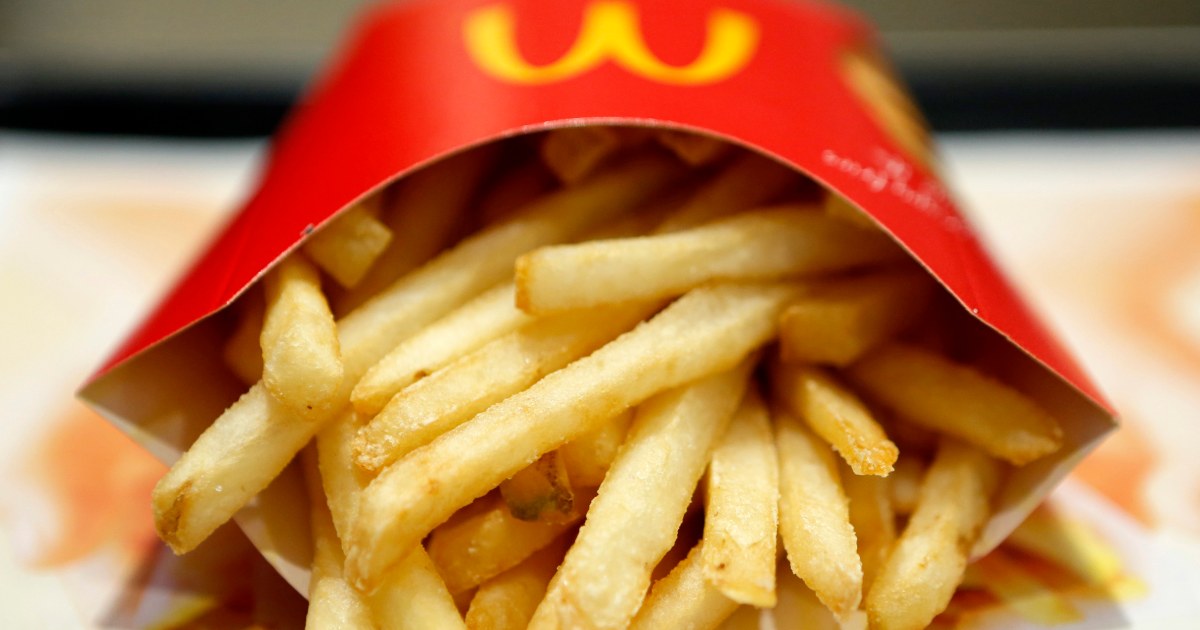
Fancy a few glasses of milk to wash down that small portion of fries?
Japan is pining for potatoes and drowning in dairy as the country grapples with unusual supply issues linked to those that have hit businesses and customers across the world recently.
McDonald’s said Tuesday that it would have to ration french fries in Japan due to a shortage, a stark contrast from government efforts to get people to drink more milk due to an excess that may otherwise force gallons of it to be thrown away.
Both crises appear to have links to both the Covid-19 pandemic and extreme weather.
The fast food giant will temporarily limit sales of its famous french fries to small portions and stop selling medium and large portions throughout the country from Dec 24 to Dec 30, the company said in a statement on its website.
McDonald’s attributed the shortage to recent flooding in Canada and supply chain disruption because of Covid-19.
It said that it imported potatoes from North America, specifically a port in Vancouver that was recently hit by delays due to flooding in the region. Paired with supply disruptions caused by the pandemic, the company faced issues getting shipments to Japan. It said that it had turned to alternative measures, including flying in frozen supplies.
McDonald’s has more than 3,000 restaurants in Japan, and is highly popular in the country.
The world’s third-largest economy has imposed strict border controls to combat Covid-19, which has led to more than 18,000 deaths in the country since the pandemic began. Japan reported its first case of community spread of the omicron variant on Wednesday, but the rate of new infections has been falling recently despite the new variant surging around the world.
“(The fries shortage) is primarily due to the supply side of McDonald’s global supply chain,” Hiroshi Ohashi, an economics professor from the University of Tokyo, told NBC News via email. “They procure potatoes from the U.S., where port shipping has been a bottleneck,” he added.
Some customers were rushing to buy their fries before the limits are introduced on Friday.
“I did not plan to eat at McDonald’s today. But then, I knew from the news that McDonald’s will not provide fries in medium portions and large portions from Friday for a week,“ Sakato Mayumi, 37, a housewife, told NBC News via Instagram. “I went to McDonald’s and had a set meal with large portions of fries.”
Japan isn’t the first country to face supply issues involving both McDonald’s and milk. The company was forced to take milkshakes off the menu for a period in the U.K. earlier this year as Covid combined with Brexit to impact the country’s supply chain.
But while fries will soon be hard to come by, the Japanese are experiencing a milk glut.
Primarily centered on farms on Hokkaido island in the north of Japan, the milk industry is suffering from what appears to be a combination of unusually high supply and low demand.
The Japan Dairy Association said on its website that the continuing spread of Covid-19 is taking a toll on demand for milk, which is often given out to school students in a carton. Local media also cited a cooler summer as a potential reason for increased supply, since such weather can be conducive to growth for dairy cows.
“(The oversupply of milk) is because of low domestic demand for milk, in which big consumers such as schools and restaurants have not been able to provide fresh meals, including milk, for long,” said Ohashi. “A large-scale shift to virtual learning brought about by the pandemic has reduced the necessity for schools to purchase milk in bulk as part of its school lunch program.”
About 5,000 tons of raw milk may need to be discarded by the end of 2021, according to government estimates.
This has led political leaders to implore the public to drink and use more of the product.
“We’d like the population to cooperate in drinking an extra cup of milk than you’d normally do and make use of milk products when cooking,” said Prime Minister Fumio Kishida during a news conference on Tuesday.
A week earlier the country’s farm minister joined the Tokyo governor at a news conference where both drank a cup of milk to set a visual example of what they hope will be a nourishing national effort.
Lawson, a Japanese convenience store franchise, is offering a 50 percent discount on cups of hot milk from Dec 31 to Jan 1 in an effort to entice winter customers.
Dairy giant Meiji also launched a campaign to boost milk consumption starring Saori Yoshida, a three-time Olympic wrestling champion.
Source: | This article originally belongs to Nbcnews.com










